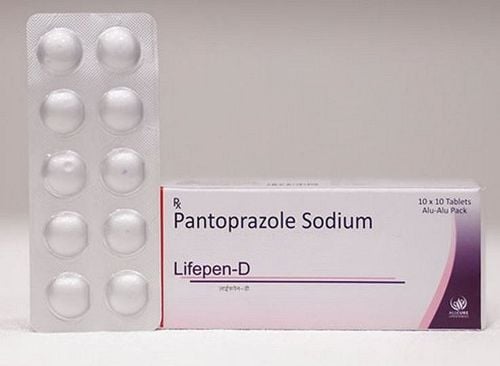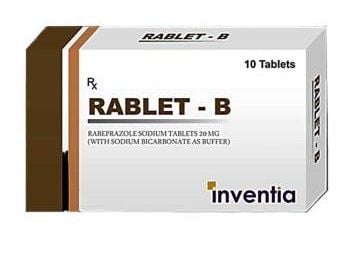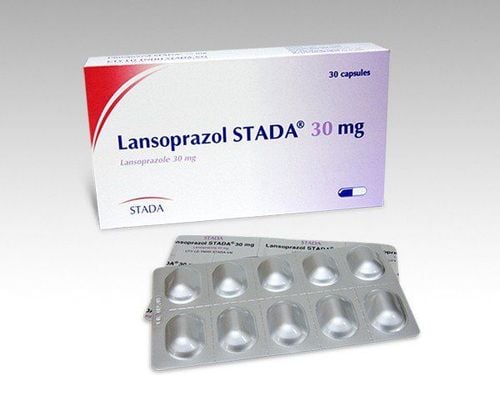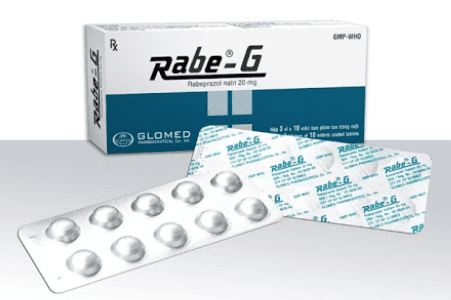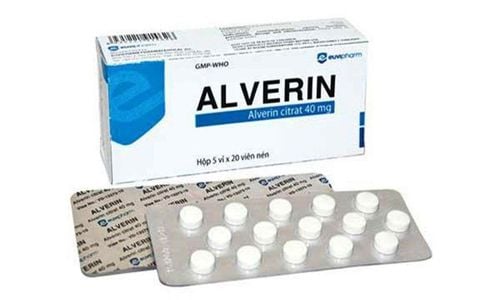This is an automatically translated article.
Rabizol 20 tablet has the main active ingredient Rabeprazol sodium. This is a drug for the treatment of active duodenal ulcer, active benign gastric ulcer, gastroesophageal reflux disease and long-term maintenance treatment in gastroesophageal reflux disease.
1. What is Rabizol 20 tablet?
Drug group: The drug belongs to the group of drugs that treat diseases of the digestive tract. Dosage form: Prepared in the form of enteric coated tablets Packing method: Box of 5 blisters x 10 tablets The main active ingredient is Rabeprazol sodium in the form of enteric coated granules with a content of 20mg. 1.1. Pharmacodynamics of Rabizol 20: Rabeprazole inhibits H+, K+ - ATPase.
Drug substance Rabeprazole sodium strongly inhibits H +, K + - ATPase prepared from gastric mucosa of pigs.
1.2. Effects of drugs Inhibition of gastric acid secretion: Rabeprazole sodium inhibits gastric acid secretion stimulated by dibutyl cyclic AMP in the gastric glands of rabbits isolated in experiments. Rabeprazole sodium strongly inhibits gastric acid secretion stimulated by histamine or pentagastrin in dogs with chronic gastric fistula as well as gastric acid secretion under normal or histamine-stimulated conditions in experimental rats. The reversal of the antisecretory activity of the active ingredient Rabeprazole sodium is faster and the increase in blood gastrin levels is lower with Rabeprazole sodium than with other proton pump inhibitors. Anti-ulcer activity:
In rats, the active ingredient rabeprazole sodium has demonstrated potent anti-ulcer activity against a variety of ulcers and ameliorated experimental gastric mucosal lesions (cold stress, stress induced by immersion in water, ligation of the pylorus, use of cysteine or ethanol-HCl).
2. What are the effects of Rabizol 20?
Rabizol 20 tablet is indicated for use in the following cases:
Treatment of active duodenal ulcer disease. Treatment of active benign peptic ulcer disease. Treatment of ulcerative or erosive gastroesophageal reflux disease (GORD). Maintenance treatment for gastroesophageal reflux disease Symptomatic treatment in moderate to very severe gastroesophageal reflux disease. Treatment of Zollinger-Ellison syndrome. In combination with appropriate antibiotics in the treatment regimen of Helicobacter pylori for people with peptic ulcer disease.
3. Usage and dosage of Rabizol
3.1. Usage of the drug The drug is suitable for oral use, the Rabizol tablet should be swallowed whole, without chewing, crushing or breaking the tablet.
3.2. Dosage of the drug Treatment of active duodenal ulcer and active benign gastric ulcer: The recommended dose is 20mg, once daily in the morning. Treatment of ulcerative or erosive gastroesophageal reflux disease (GORD): The recommended therapeutic dose is 20 mg once daily for 4 to 8 weeks. Long-term maintenance dose of gastroesophageal reflux disease: For long-term treatment, the recommended dose is 20 mg or 10 mg once daily, depending on individual response. Symptomatic treatment of moderate to very severe gastroesophageal reflux disease: The recommended therapeutic dose is 10 mg once daily in patients without esophagitis. If symptoms are not controlled within 4 weeks, you should be re-diagnosed by your doctor. Once signs and symptoms have resolved, symptom control can then be achieved with daily nutrition as required and using a dose of l0 mg once daily as needed. Treatment of Zollinger-Ellison syndrome: The recommended starting dose is 60 mg once daily. The dose may be increased to 100 mg once daily or to 120 mg twice daily based on patient needs. You should continue to maintain as clinically indicated. For patients with renal and hepatic impairment: No dosage adjustment is required for patients with renal or hepatic impairment. Treatment with children: Rabeprazole is not recommended for use in children. There is no experience in using the drug in this group of patients. Note: The above therapeutic dose is for reference only, as recommended by the manufacturer. The specific dose depends on the health condition and progress of the disease for each specific person. For the right therapeutic dose, you need to consult with your doctor or medical professional.
4. In case of overdose or forgetting dose of Rabizol
In case of overdose: There is currently no specific antidote for rabeprazole. Active ingredient Rabeprazole is strongly bound to plasma proteins, therefore, hemodialysis is not performed. As with other overdose cases, your doctor will treat you symptomatically and take appropriate supportive measures.
In case of missed dose: When you forget to take a dose, you need to take it as soon as you remember. However, if it is almost time for your next dose, skip the missed dose and take your next dose at the scheduled time. You need to be careful not to take more than double the prescribed dose.
5. Undesirable effects of the drug Rabizol
Undesirable effects that may be encountered during treatment with Rabizol include: asthenia, fever, allergic reactions, chills, fatigue, chest pain below the sternum, stiff neck, photosensitivity , gastrointestinal disorders , dry mouth , belching , rectal bleeding , black stools , gallstones , ulcers of the oral mucosa , cholecystitis , colitis , esophagitis , glossitis or pancreatitis .
6. Rabizole drug interactions
Rabeprazole sodium is a potent and long-lasting inhibitor of gastric acid secretion. Rabizol may interact with drugs that are absorbed depending on gastric pH.When Rabizol is used with Ketoconazole or Itraconazole, there can be a significant decrease in antifungal drug concentrations. As a result, your doctor may monitor your health while taking this medication to determine if a dose adjustment of ketoconazole or itraconazole is required when used concomitantly with the active ingredient Rabeprazole.
7. Some notes when using Rabizol
7.1. Contraindications of the drug Rabizol 20 tablets are contraindicated in the following cases:
Contraindicated in patients with hypersensitivity to the main ingredient Rabeprazol sodium or any other ingredient of the drug. Pregnant and lactating women. 7.2. Precautions for use: People on long-term treatment, especially those on treatment lasting more than one year, should be regularly monitored. There is a risk of cross-hypersensitivity reactions between Rabizol and other proton pump inhibitors or benzimidazole derivatives. Rabizol tablets should be swallowed whole and should not be chewed or crushed. Rabeprazole is not recommended for use in children. Therefore, at present, there is no experience in using the drug in this group of subjects. Ability to drive and use machines: Based on the pharmacokinetics and adverse reactions data, it is unlikely that Rabizol will affect the ability to use machines or drive. However, if you feel drowsy while using the drug, you should not drive or operate machinery. Pregnancy: There are no data on the safety of Rabizol during pregnancy. Lactation: It is not known whether rabeprazole is excreted in human milk. Rabizol has not been studied in lactating women. However, the active ingredient Rabeprazole is excreted in the milk of rats. Therefore, Rabizol should not be used in women who are breastfeeding. Rabizol 20 tablet contains the active ingredient Rabeprazole sodium. This is a drug for the treatment of active duodenal ulcer, active benign gastric ulcer, gastroesophageal reflux disease and long-term maintenance treatment in gastroesophageal reflux disease.
To ensure effective treatment and avoid unwanted side effects, patients need to strictly follow the instructions of the doctor, professional pharmacist.
Follow Vinmec International General Hospital website to get more health, nutrition and beauty information to protect the health of yourself and your loved ones in your family.
Please dial HOTLINE for more information or register for an appointment HERE. Download MyVinmec app to make appointments faster and to manage your bookings easily.





